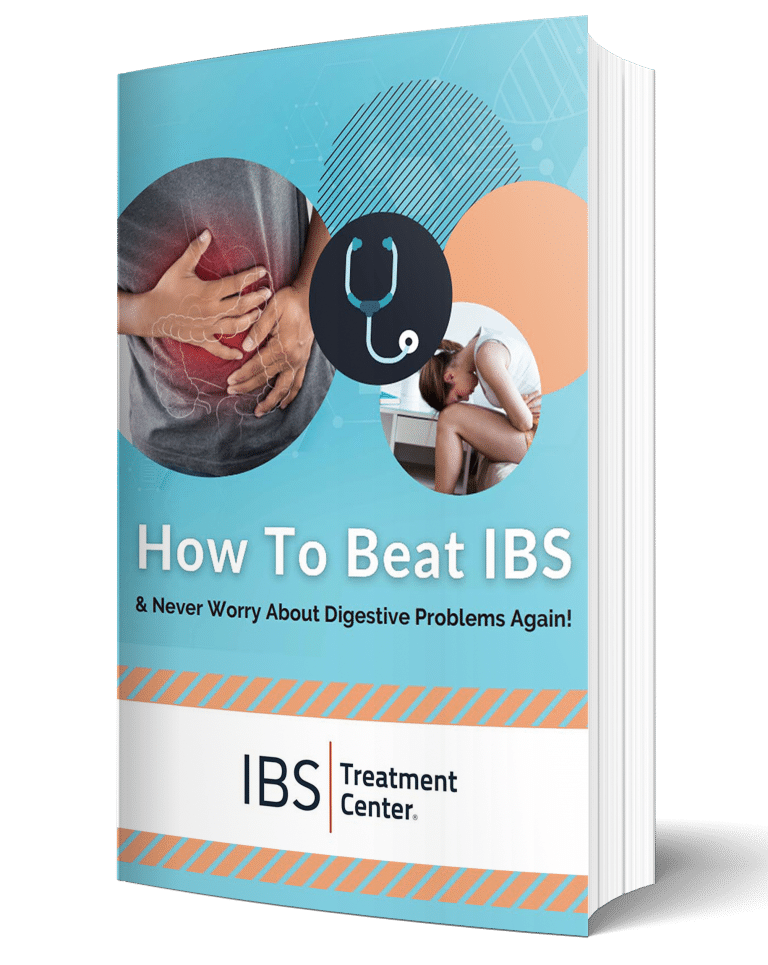Here’s what we’re going to cover
- The Difference Between IBS and Celiac
- IBS Symptoms vs Celiac Disease
- Do I Have Celiac Disease or IBS?
- Does Gluten Make IBS Worse?
- Can You Have Both Celiac Disease And IBS?
The Difference Between IBS and Celiac

An IBS sufferer and someone with celiac disease may have the exact same symptoms, or they may have completely different symptoms. But IBS always involves digestive symptoms. Celiac disease does not always involve digestive symptoms.
Many people think that celiac disease, like IBS, is defined by digestive symptoms, but it is not. Celiac disease is defined by a very specific kind of damage found in the small intestine called villous atrophy. This damage can be seen under a microscope, and it can also be diagnosed with the right blood test.
IBS Symptoms vs Celiac Disease
People with celiac disease may have one or all of the same digestive symptoms seen in IBS. Or, they may not have any digestive symptoms at all. They might just have fatigue, or brain fog, or osteoporosis, or headaches, or a skin rash, or one of a hundred other symptoms associated with Celiac disease.
In fact, people with celiac disease may not have any symptoms, digestive or otherwise – a strange but often true fact about celiac disease. But they always have that specific damage in the small intestine called villous atrophy.
So, IBS is defined by the symptoms vs. celiac disease is defined by the diagnosis, as we just described.
Do I Have Celiac Disease or IBS?
When the symptoms are the same in these two conditions, as they can be and often are, it is impossible to tell the difference between celiac disease and IBS without testing for celiac disease.
There is no test for IBS. IBS is an umbrella term that covers people with digestive problems for which no better explanation has been given. It’s what’s known as a diagnosis of exclusion. When doctors feel like they’ve excluded everything else, they leave you with IBS. It’s a very unsatisfying diagnosis because it’s only a label. It’s not a solution. And unfortunately, many people receive very poor care for IBS.
But celiac disease is a very clearly understood condition with a very clear treatment. And one of the things that must be ruled out in IBS patients is celiac disease. The testing for celiac disease is relatively simple, and a blood test can tell you if you have it. So, if you have IBS, then you need to be tested for celiac disease, because celiac disease can cause IBS (and it can affect the large intestine). And if you do have celiac disease, then avoiding gluten (the treatment for Celiac disease) may solve your problem.
Does Gluten Make IBS Worse?

Celiac disease is the most well-known form of gluten intolerance, but it’s not the only one. There are other types of gluten reactions, known as non-celiac gluten sensitivities. And sometimes these non-celiac gluten sensitivity reactions result in IBS. In such cases gluten will make your IBS worse.
However, there are literally hundreds of causes of IBS. And although gluten is one of them and can make IBS worse, or even be the sole cause of IBS, most of the time gluten is not involved in IBS. But, of course, something is causing your IBS. And this is what an IBS specialist helps you do, sort out the cause of your IBS so that you can get better and no longer have IBS or digestive problems.
Can You Have Both Celiac Disease And IBS?
Yes! You can have both celiac disease and IBS. This is a relatively common problem. And it’s fairly easy to diagnose. If you test positive for Celiac disease, then you need to avoid gluten in your diet. And if you avoid gluten, but you still have IBS, then you have both.
In cases like this, celiac disease is only one of the factors involved in your IBS. Or, it may not be part of your IBS at all, meaning that you can have celiac disease and not have it be the primary cause of your digestive problems. There are other causes of IBS that can be diagnosed and treated so that you can solve your IBS.
Would you like help sorting out the cause of your IBS?

Dr. Wangen is the founder and medical director of the IBS Treatment Center, the award winning author of two books, and a nationally recognized speaker on digestive disorders. He has been on ABC, NBC, and Fox as well as public radio, and was named one of Seattle’s Top Doctors by Seattle Magazine.

